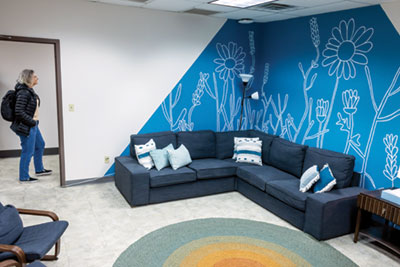UT Health Austin’s Program Supports Student Mental Health
Abstract
Amplify is an integrated mental health clinic geared toward young adults with mild to moderate mental health needs.
Transitioning to adulthood can be challenging enough without experiencing symptoms of psychiatric disorders.
And while the United States has made great strides in reaching young people with serious mental illness via coordinated care centers, the country is falling short on quality, wraparound treatment options for young adults with mild to moderate mental illness. So said Vanessa Klodnick, Ph.D., L.C.S.W., a research scientist with the Texas Institute for Excellence in Mental Health at the University of Texas at Austin, at this year’s Mental Health Services Conference.
Integrated care centers, one-stop shops for the behavioral and physical health needs of young adults, may be the solution. “These centers offer a ‘light touch’ of care that is focused more on supporting social and personal growth,” she told the audience.

Calming colors and patterns adorn the interior of the Amplify Center for young adults, creating a safe and relaxing space “where [students] won’t feel judged.”
One such successful model of integrated care, called headspace, began in Australia in 2016. The program offers mental and physical health services, family programs, and work and study support for youth aged 12 to 25, Since 2016, headspace has grown to include 154 centers across Australia. Similar centers have also been established in Europe and Canada; in 2021, allcove, which is affiliated with Stanford University, began opening sites in California. In January 2023, UT Health Austin, in collaboration with Austin Community College, opened the Amplify Center.
The Amplify Center has some differences from existing models, explained Deborah Cohen, Ph.D., the center’s executive director, during the session. Instead of serving youth aged 12 to 25 years, Amplify focuses on young adults aged 18 to 29, she said.
The center is located on the campus at Austin Community College, which Cohen noted enrolls a large minority young adult population. Currently in a pilot stage, the program is open only to students at the school (The college offered a free two-year lease for the program in exchange for the center serving its students during the pilot phase.)
The center offers a range of services including individual and group counseling, peer support services, education and employment services, and help navigating other areas of health care; limited on-site psychiatric consultations are also available.
The center is “a place where [students] won’t feel judged and are comfortable sharing,” Klodnick said.
Interested students fill out a screening form, which Cohen stressed was not part of their electronic health record. The form is reviewed by staff who then divide the applicants into one of three groups: those with severe psychiatric symptoms are referred for specialty care, while those experiencing mild symptoms are transferred to campus counseling. “Amplify takes the ‘missing middle’—the group who report high levels of distress but do not quite meet diagnostic criteria of illness,” Cohen said.
Cohen told the audience that through July 2023, 63 students have been screened at Amplify and 50 have started receiving services; by last summer Amplify had to put students on a wait list to not overburden the small staff of five.
Preliminary data from the 50 students seen at Amplify are promising. Sixty days after entering the program, average scores on the 10-item Clinical Outcomes in Routine Evaluation scale (a common tool to assess psychological distress) dropped by 32%.
Looking forward, Cohen said Amplify hopes to secure additional funding sources to add more staff, including a care manager to help students with scheduling primary care or mental health appointments. They are also looking at possibly expanding access to 18- and 19-year-olds who are not students at the college, but live in east Austin. ■



